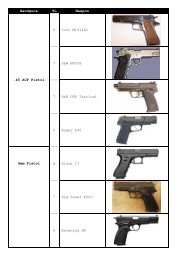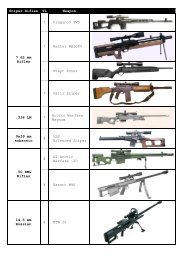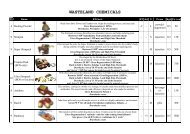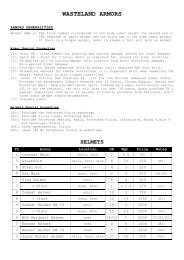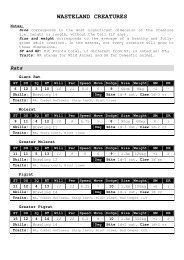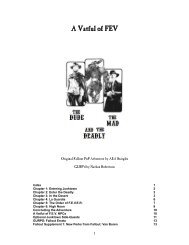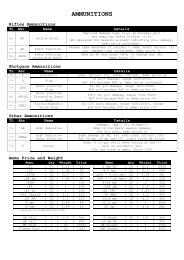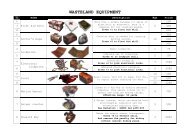GURPS: FALLOUT - Fallout GURPS - Free
GURPS: FALLOUT - Fallout GURPS - Free
GURPS: FALLOUT - Fallout GURPS - Free
Create successful ePaper yourself
Turn your PDF publications into a flip-book with our unique Google optimized e-Paper software.
Starting Money<br />
Chapter 12: Equipment<br />
Average starting money is 1000 Bottlecaps, all of it available for gear. 1<br />
Bottlecap = 1 <strong>GURPS</strong> $ = 1 liter (quart) of clean drinking water<br />
(Value of Bottlecaps are backed by the Water Merchants of the Hub, the<br />
largest trading city of the California region.). If adventuring in the Midwest,<br />
Pulltabs (pt) take the place of Bottlecaps (bc) among the tribesmen of the<br />
area (at the same monetary value). Yet another common form of currency<br />
is Brotherhood of Steel scrip (1 bs = 1 bc (or pt) = 1 liter of water), which<br />
only has value in a Brotherhood bunker.<br />
Heroes may be Dead Broke (0 bc), Poor (200 bc), Struggling (500 bc),<br />
Comfortable (2000 bc), or Wealthy (5000 bc) at the usual point costs. Very<br />
Wealthy and Filthy Rich is off-limits (at least at character creation – see<br />
the Advantages section, page 27).<br />
Signature Gear<br />
Any adventurer may designate a nonexpendable item as Signature Gear<br />
and pay 1 point (instead of cash) per 500 bc in value. This makes it part of<br />
his abilities, buying the GM’s word that he won’t often be without it. The<br />
GM has the final say on what may be purchased i this manner.<br />
Extra Money<br />
In addition, starting characters may trading points for money (p. B26).<br />
Since Signature Gear is worth 500 bc / point, it’s fair to give the same<br />
oomph to those blowing points on things that do risk being broken or worn<br />
out. Each point sacrificed yields 500 bc – not merely 100 bc – in extra<br />
starting money. Dead Broke PCs cannot do this! To encourage<br />
adventurers to go on adventures, this option isn’t available after the<br />
campaign begins.<br />
Equipment Quality<br />
Very Cheap equipment costs 1/4 normal cost, Cheap equipment costs 1/2<br />
cost. Cheap weapons are at -1 to Acc, Very Cheap weapons suffer twice<br />
as severe penalties. Armor and other items which are not weapons have<br />
'Ablative' DR if cheap, and ablate twice as fast if very cheap (when<br />
DR reaches zero, the item is broken).<br />
Fuel Costs<br />
Fossil based fuels like Gasoline are scarce and cost at least x10 times the<br />
normal price when available. On the other hand, renewable fuels like<br />
wood, coal, hydrogen or methanol cost only 1x the price where available<br />
at considerable quantities.<br />
Notes on Equipment List:<br />
• All equipment is TL 7 unless otherwise noted.<br />
• 'Rolls to Build' = Skill rolls with modifiers required to both acquire<br />
the parts and to build the item.<br />
• 'Design Blueprints' = The minimum time required to design the<br />
item.<br />
• 'Limited Production' = The minimum time required to build the<br />
item, after the necessary parts have been acquired.<br />
Hazard Detection Devices<br />
Item Weight Cost (bc)<br />
Geiger Counter 4 200<br />
Chemical Sensor 1 200<br />
RadTab Neg. 30<br />
Hazard Detection Devices<br />
There are various types of chemical/biological/nuclear detection devices<br />
available; some are hand-held devices, some are worked into clothing,<br />
others are mounted on helmets and gloves. The numerous models,<br />
produced during the final stages of civilization’s wars, vary in size, shape,<br />
color, and name, but pretty much work the same. The three main types are<br />
as follows:<br />
Chemical Sensor: These devices, typically hand-held and possessing a<br />
microphone-like protrusion, detect the general presence of toxic chemical<br />
gasses in the vicinity. Such an item detects only chemical agents (not<br />
radiation), including hazardous chemicals (any form), chemical<br />
contaminants, and various nerve/irritant/blood agents. A chemical sensor’s<br />
range is 50 ft. Works with a small energy cell for up to a month per charging.<br />
Skill to use: Electronics Operation(Sensors) or NBC Warfare<br />
Durability: PD 3, DR 5, HP 3<br />
Rolls to build: Scrounging -5, Engineer(Electric) +0<br />
Tools: Basic Toolkit (Electronics)<br />
Design Blueprints: 14 hours<br />
Limited Production: 5 hours<br />
Geiger Counter: This durable piece of equipment is capable of measuring<br />
radiation, either in immediate surroundings, or with a more focused<br />
scanning with a small probe. Measures radiation in roentgens or rads.<br />
Works with a small energy cell for up to a month per charging. Its<br />
electronics are hardened to withstand EMPs.<br />
Skill to use: Electronics Operation(Sensors) or NBC Warfare<br />
Durability: PD 3, DR 5, HP 3<br />
Rolls to build: Scrounging -5, Engineer(Electric) +0<br />
Tools: Basic Toolkit (Electronics)<br />
Design Blueprints: 14 hours<br />
Limited Production: 5 hours<br />
Rad Tab: Such items come in all shapes and sizes, but are usually installed<br />
as a colored strip on an I.D. badge, arm band, etc. The strip changes color<br />
when the wearer comes close to dangerous radiation level areas. Such an<br />
item changes from black to yellow at mild levels, yellow to orange at low<br />
levels, and orange to red at moderate levels or more. After exposure to<br />
radiation, a Rad Tab cannot be used again. Range is immediate.<br />
Survival Gear<br />
Item Weight Cost (bc)<br />
Respirator Mask neg. 20<br />
Respirator Mask NBC-Filters neg. 10<br />
Cigarette Lighter neg. 100<br />
Emergency Raft 2 100<br />
Halazone Tablets neg. 50<br />
Personal Water Purifier 1 60<br />
Water Flask 1 10<br />
Waterproof Matches neg. 2<br />
Cooling Suit (TL8) 5 600<br />
Magnesium Firestarter neg. 35<br />
Salt Pills neg. 20<br />
Survival Kit 4 300<br />
Light Rod neg. 15<br />
36



